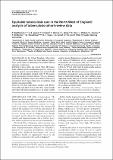Files in this item
Equitable tuberculosis care in the North West of England : analysis of tuberculosis cohort review data
Item metadata
| dc.contributor.author | MacPherson, P. | |
| dc.contributor.author | Squire, S. B. | |
| dc.contributor.author | Cleary , P. | |
| dc.contributor.author | Davies, S. | |
| dc.contributor.author | Wake, C. | |
| dc.contributor.author | Dee, K. | |
| dc.contributor.author | Walker, J. | |
| dc.contributor.author | Farrow, S. | |
| dc.contributor.author | McMaster, P. | |
| dc.contributor.author | Woodhead, M. | |
| dc.contributor.author | Sloan, Derek James | |
| dc.contributor.author | North West TB Audit Steering Committee | |
| dc.date.accessioned | 2016-05-12T11:30:08Z | |
| dc.date.available | 2016-05-12T11:30:08Z | |
| dc.date.issued | 2016-06-01 | |
| dc.identifier | 242524733 | |
| dc.identifier | 2210afbb-913c-468a-9928-61198ebb5dda | |
| dc.identifier | 84966668507 | |
| dc.identifier.citation | MacPherson , P , Squire , S B , Cleary , P , Davies , S , Wake , C , Dee , K , Walker , J , Farrow , S , McMaster , P , Woodhead , M , Sloan , D J & North West TB Audit Steering Committee 2016 , ' Equitable tuberculosis care in the North West of England : analysis of tuberculosis cohort review data ' , International Journal of Tuberculosis and Lung Disease , vol. 20 , no. 6 , pp. 778-785 . https://doi.org/10.5588/ijtld.15.0772 | en |
| dc.identifier.issn | 1027-3719 | |
| dc.identifier.other | ORCID: /0000-0002-7888-5449/work/60631024 | |
| dc.identifier.uri | https://hdl.handle.net/10023/8789 | |
| dc.description.abstract | BACKGROUND: In the United Kingdom, tuberculosis (TB) predominantly affects the most deprived populations, yet the extent to which deprivation affects TB care outcomes is unknown. METHODS: Since 2011, the North West TB Cohort Audit collaboration has undertaken quarterly reviews of outcomes against consensus-defined care standard indicators for all individuals notified with TB. We investigated associations between adverse TB care outcomes and Index of Multiple Deprivation (IMD) 2010 scores measured at lower super output area of residence using logistic regression models. RESULTS: Of 1831 individuals notified with TB between 2011 and 2014, 62% (1131/1831) came from the most deprived national quintile areas. In single variable analysis, greater deprivation was significantly associated with increased likelihood of the completion of a standardised risk assessment (OR 2.99, 95%CI 5.27–19.65) and offer of a human immunodeficiency virus test (OR 1.72, 95%CI 1.10–2.62). In multivariable analysis, there were no significant associations. CONCLUSIONS: TB patients in the most deprived areas had similar care indicators across a range of standards to those of individuals living in the more affluent areas, suggesting that the delivery of TB care in the North West of England is equitable. The extent to which the cohort review process contributes to, and sustains, this standard of care deserves further study. | |
| dc.format.extent | 8 | |
| dc.format.extent | 222584 | |
| dc.language.iso | eng | |
| dc.relation.ispartof | International Journal of Tuberculosis and Lung Disease | en |
| dc.subject | England | en |
| dc.subject | TB cohort review | en |
| dc.subject | Patient-centred care | en |
| dc.subject | Socio-economic deprivation | en |
| dc.subject | Tuberculosis | en |
| dc.subject | RA0421 Public health. Hygiene. Preventive Medicine | en |
| dc.subject | NDAS | en |
| dc.subject | SDG 3 - Good Health and Well-being | en |
| dc.subject.lcc | RA0421 | en |
| dc.title | Equitable tuberculosis care in the North West of England : analysis of tuberculosis cohort review data | en |
| dc.type | Journal article | en |
| dc.contributor.institution | University of St Andrews. School of Medicine | en |
| dc.identifier.doi | https://doi.org/10.5588/ijtld.15.0772 | |
| dc.description.status | Peer reviewed | en |
This item appears in the following Collection(s)
Items in the St Andrews Research Repository are protected by copyright, with all rights reserved, unless otherwise indicated.

